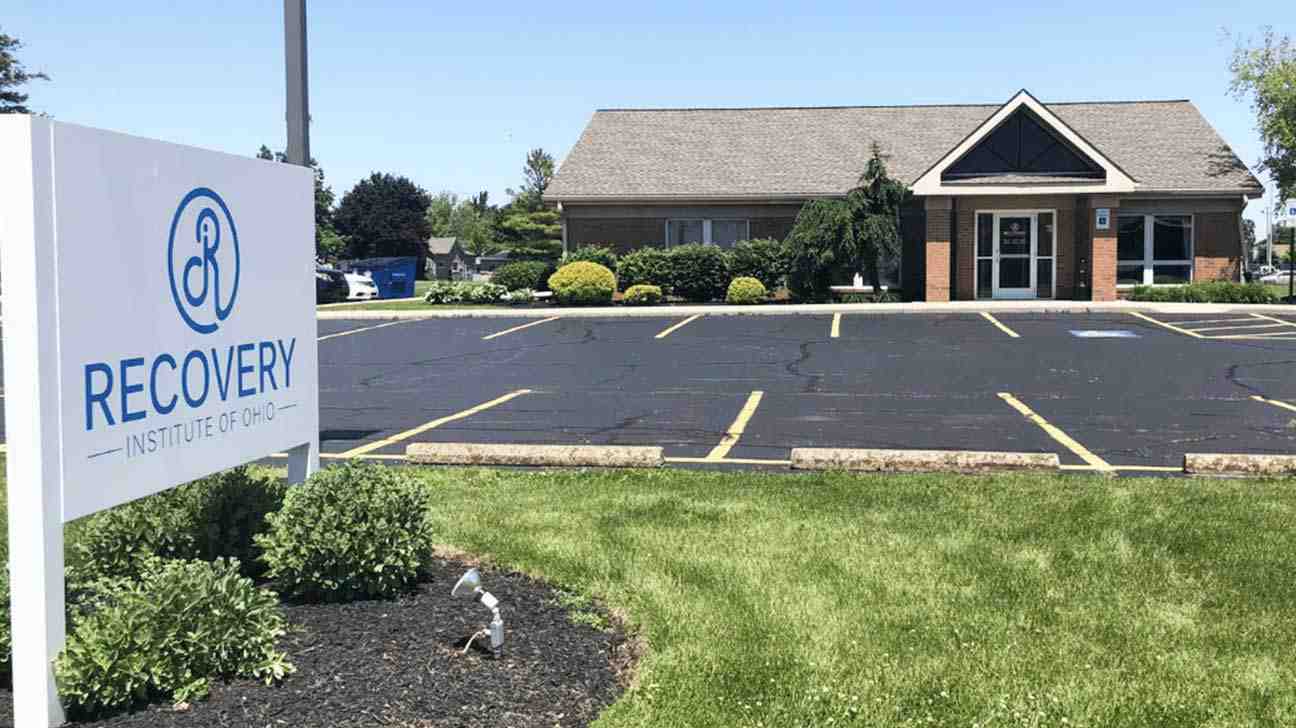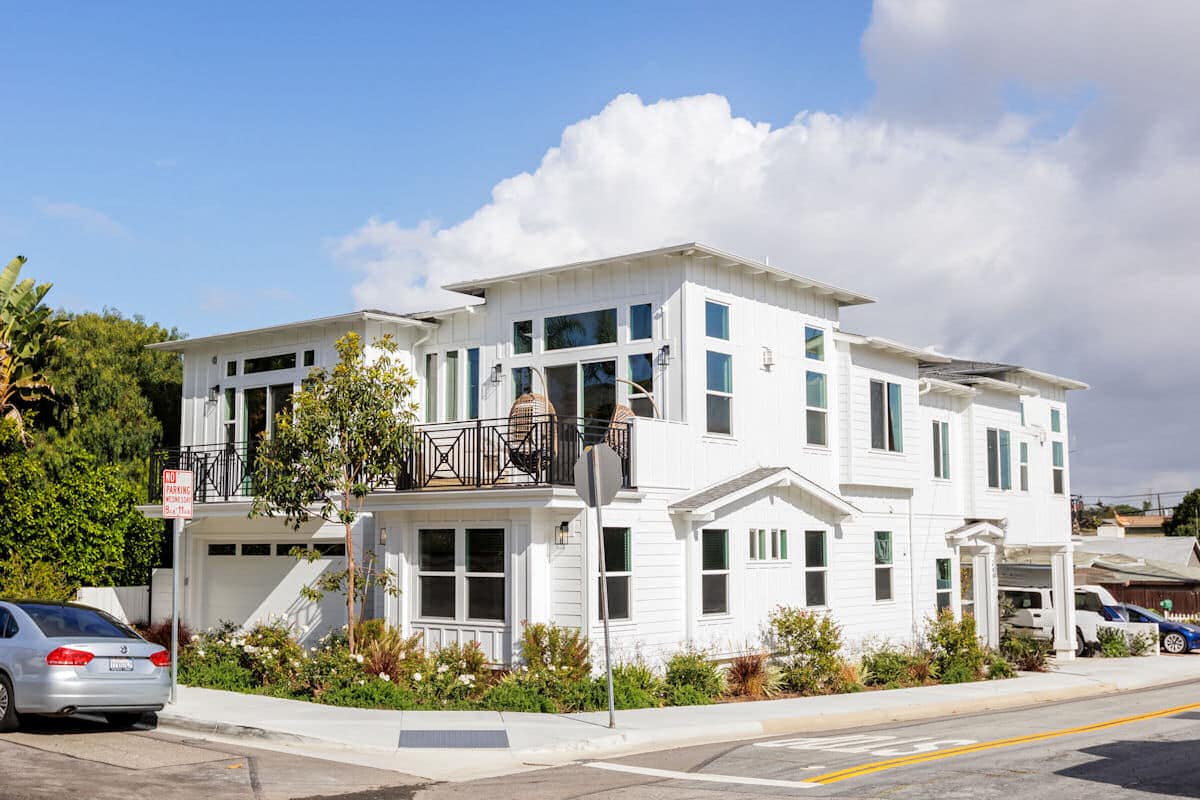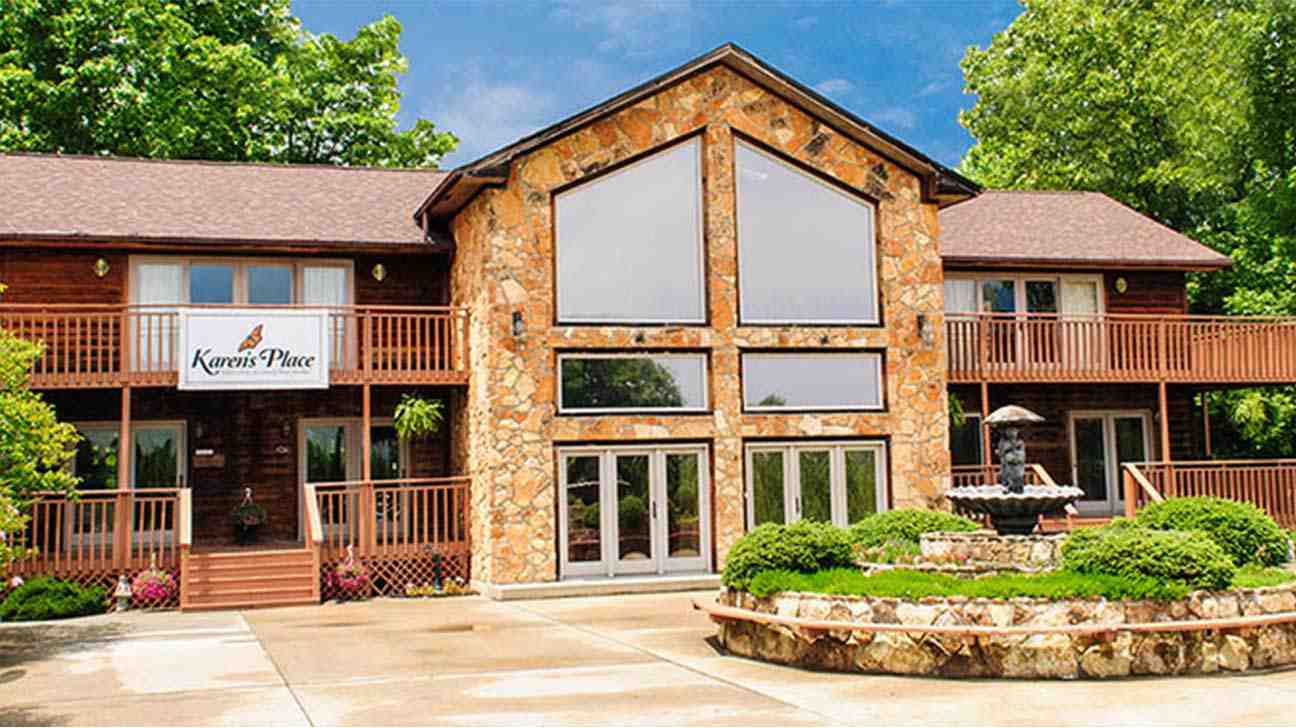
Understanding Medicaid Coverage for Alcohol Rehab
Medicaid alcohol rehab is a lifeline for millions of Americans struggling with addiction who cannot afford private treatment. With inpatient rehab costing $5,000 to $30,000 per month, many people simply cannot access the care they desperately need. But there’s hope.
Quick Answer: Accessing Medicaid Alcohol Rehab
- Check Your Coverage – Medicaid covers screening, detox, inpatient care, outpatient programs, and medication-assisted treatment
- Confirm Eligibility – Must earn less than 138% of Federal Poverty Level in expansion states (varies by state)
- Find a Facility – Search through state behavioral health departments or call helplines
- Verify Accreditation – Look for Joint Commission, CARF, or state licensing
- Begin Treatment – Most Medicaid recipients have minimal to no co-pays
Medicaid is the largest single payer for behavioral health services in the United States. Thanks to the Affordable Care Act (ACA), Medicaid must cover substance use disorder treatment as an essential health benefit. This includes screening, detox, inpatient care, outpatient programs, and medications to support recovery.
The challenge isn’t whether Medicaid covers alcohol rehab—it does. The challenge is navigating the system to find quality care that accepts your coverage.
At Addiction Helpline America, we help individuals and families access life-saving Medicaid alcohol rehab services. Our team understands the complexities of insurance and state-by-state variations, and we connect people with accredited facilities that provide evidence-based care.
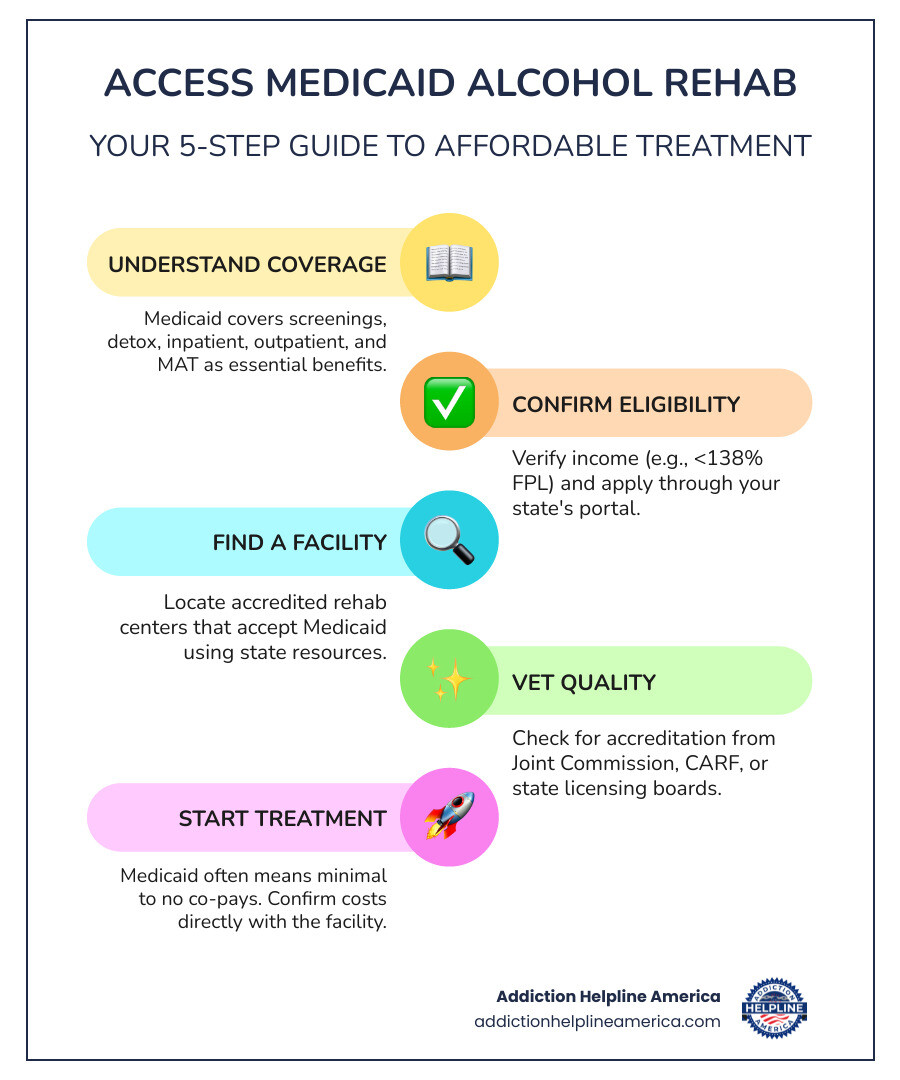
Know your Medicaid alcohol rehab terms:
Step 1: Understand Your Medicaid Coverage for Alcohol Addiction
Admitting you need help is the first step. Now, let’s see what Medicaid alcohol rehab covers. Medicaid is a joint federal and state health insurance program for low-income individuals and families. While the federal government sets basic rules, each state runs its own program, so covered services can vary slightly.
A key law is the Mental Health Parity and Addiction Equity Act (MHPAEA). It requires insurance plans, including Medicaid, to provide mental health and addiction benefits that are comparable to physical health benefits. If your plan covers a broken leg, it must offer similar coverage for alcohol addiction.
Want to dive deeper into how addiction treatment works? Check out our comprehensive guide on Addiction Treatment. And for a complete breakdown of what behavioral health services Medicaid covers, visit our page on Behavioral Health Services coverage details.
What Does Medicaid Alcohol Rehab Coverage Include?
Medicaid’s coverage for alcohol addiction is comprehensive, supporting you through every stage of recovery.

- Screenings and Interventions: Initial assessments to determine the appropriate level of care.
- Medical Detoxification: Medically supervised withdrawal from alcohol to manage symptoms safely in an inpatient or outpatient setting.
- Inpatient Care: 24/7 support in a residential facility for intensive, structured treatment.
- Outpatient Programs: Flexible treatment options like Intensive Outpatient Programs (IOPs) and Partial Hospitalization Programs (PHPs) that allow you to live at home.
- Medication-Assisted Treatment (MAT): FDA-approved medications (naltrexone, acamprosate, disulfiram) to reduce cravings and prevent relapse, combined with counseling.
- Addiction Counseling: Individual, group, and family therapy to address the root causes of addiction and build coping skills.
- Mental Health Services: Integrated treatment for co-occurring conditions like depression or anxiety.
- Long-Term Residential Treatment: Extended support for those who need it, covered by some state plans.
- Aftercare Planning: Resources to help you maintain sobriety after completing a program.
For more detailed information about alcohol-specific treatment approaches, visit our page on Alcohol Rehab.
How the Affordable Care Act (ACA) Expanded Coverage
Before the Affordable Care Act (ACA), getting insurance for addiction treatment was difficult. The ACA changed everything for Medicaid alcohol rehab by making substance use disorder treatment an “essential health benefit” that all plans, including Medicaid, must cover. Insurers can no longer deny coverage for addiction as a pre-existing condition or impose stricter limits on rehab than on other medical care.
The ACA also allowed states to expand their Medicaid programs to cover adults earning up to 138% of the federal poverty level. This opened the door for millions of low-income individuals who previously fell into a coverage gap. As a result, Medicaid is now the single largest payer for addiction treatment services in the U.S., making care accessible to countless people.
To understand more about how the ACA transformed Medicaid coverage for addiction treatment, read our detailed resource on the ACA and Medicaid.
Step 2: Confirm Your Eligibility and Apply
Before accessing Medicaid alcohol rehab, you must confirm you qualify in your state. Medicaid serves low-income adults, children, pregnant women, seniors, and people with disabilities. While the federal government sets guidelines, each state has its own rules.
Eligibility primarily depends on your income relative to the Federal Poverty Level (FPL). In states that expanded Medicaid, adults earning up to 138% of the FPL can qualify. For 2025, this is up to $15,650 for a single person or $26,650 for a three-person household. Other factors include household size, disability status, age, and pregnancy. Don’t assume you won’t qualify—many people are surprised to learn they’re eligible.
How to Apply: A Look at Missouri (MO HealthNet)
Applying for Medicaid is a manageable process. Let’s use Missouri’s program, MO HealthNet, as an example. The process is similar in most states.

Missouri offers several ways to apply. The fastest is usually the online portal (myDSS), where you can upload documents and track your status. You can also download, complete, and mail a paper application. For in-person help, visit a local Family Support Division office to work with a caseworker. Some states also allow applications by phone.
To apply, you’ll need to gather some documents:
- Proof of income (pay stubs, tax returns)
- Identification (driver’s license, state ID)
- Proof of address (utility bill, lease)
- Social Security numbers for all applicants
- Medical records if applying based on a disability
Fill out the application completely to avoid delays. Approval typically takes 45 to 90 days, but benefits can sometimes be backdated. If you feel overwhelmed, Addiction Helpline America can help you understand your options and connect you with resources to get coverage and start treatment.
Step 3: Finding a Medicaid Alcohol Rehab Center
Once you’re eligible for Medicaid, the next step is finding a Medicaid alcohol rehab center. Not every facility accepts Medicaid, and options can be limited depending on your location, but quality treatment is attainable.
Addiction Helpline America is here to connect you with treatment centers nationwide. Our confidential helpline can guide you to facilities that accept your specific Medicaid plan. Your state’s behavioral health department is another key resource. In Missouri, the Missouri Department of Mental Health’s Division of Behavioral Health (DBH) offers directories of providers. The Substance Abuse and Mental Health Services Administration (SAMHSA) also provides a national helpline and an online treatment locator that can help.
Finding care can have challenges. Limited availability is a real issue, especially in rural areas. While many facilities accept Medicaid, the number varies by location. You might also encounter waitlists due to high demand, though priority is often given to pregnant women or those in crisis.
If you’re in immediate need of medical detoxification, time is of the essence. For guidance on finding urgent detox services, visit our page on Detox Hospital Options.
The Benefits of Exploring Different Treatment Locations
If local options are scarce, consider treatment centers in other locations. This can open up significant opportunities for your recovery.
Removing yourself from your familiar environment provides a fresh start, free from the daily triggers that challenge early recovery. A new location creates a focused recovery environment where your only job is to heal. Expanding your search also gives you a wider range of options, including specialized programs for trauma, co-occurring disorders, or specific demographics that may not be available locally.
If travel isn’t feasible, Virtual Rehab is an increasingly popular option. Many Medicaid plans now cover telehealth services, allowing you to access counseling and support remotely.
Are There Rehabs That Accept Medicaid Near Missouri?
If you’re in Missouri and struggling to find a local Medicaid alcohol rehab, you have alternatives. Neighboring states like Illinois, Kentucky, Kansas, and Tennessee have facilities that accept Medicaid.
However, verifying out-of-state coverage is essential. Your Missouri Medicaid generally only covers emergencies outside the state. Some states have agreements or waivers for specific services like addiction treatment if they are medically necessary and unavailable in your home state. Full portability of benefits is not guaranteed.
Before committing to an out-of-state facility, confirm coverage with both your state’s Medicaid office and the treatment center. This can be complex, but you don’t have to steer it alone. Call Addiction Helpline America to clarify your options and connect with facilities that accept your plan, whether in Missouri or elsewhere.
Step 4: Vet the Quality and Accreditation of a Facility
Finding a facility that accepts Medicaid is half the battle; ensuring it provides quality care is the other. Not all treatment centers are equal. Some use outdated methods, while a few predatory programs exist only to bill insurance. Your recovery is too important to leave to chance.
Vetting a facility’s credentials is the best way to ensure it meets high standards for patient care and safety. For a deeper understanding of what makes addiction treatment truly effective, take a look at our guide on the Principles of effective addiction treatment.
How to Check for Accreditation and Licensing
Accreditation is a seal of approval from trusted organizations. It means independent experts have verified that a facility meets rigorous standards for quality and safety.
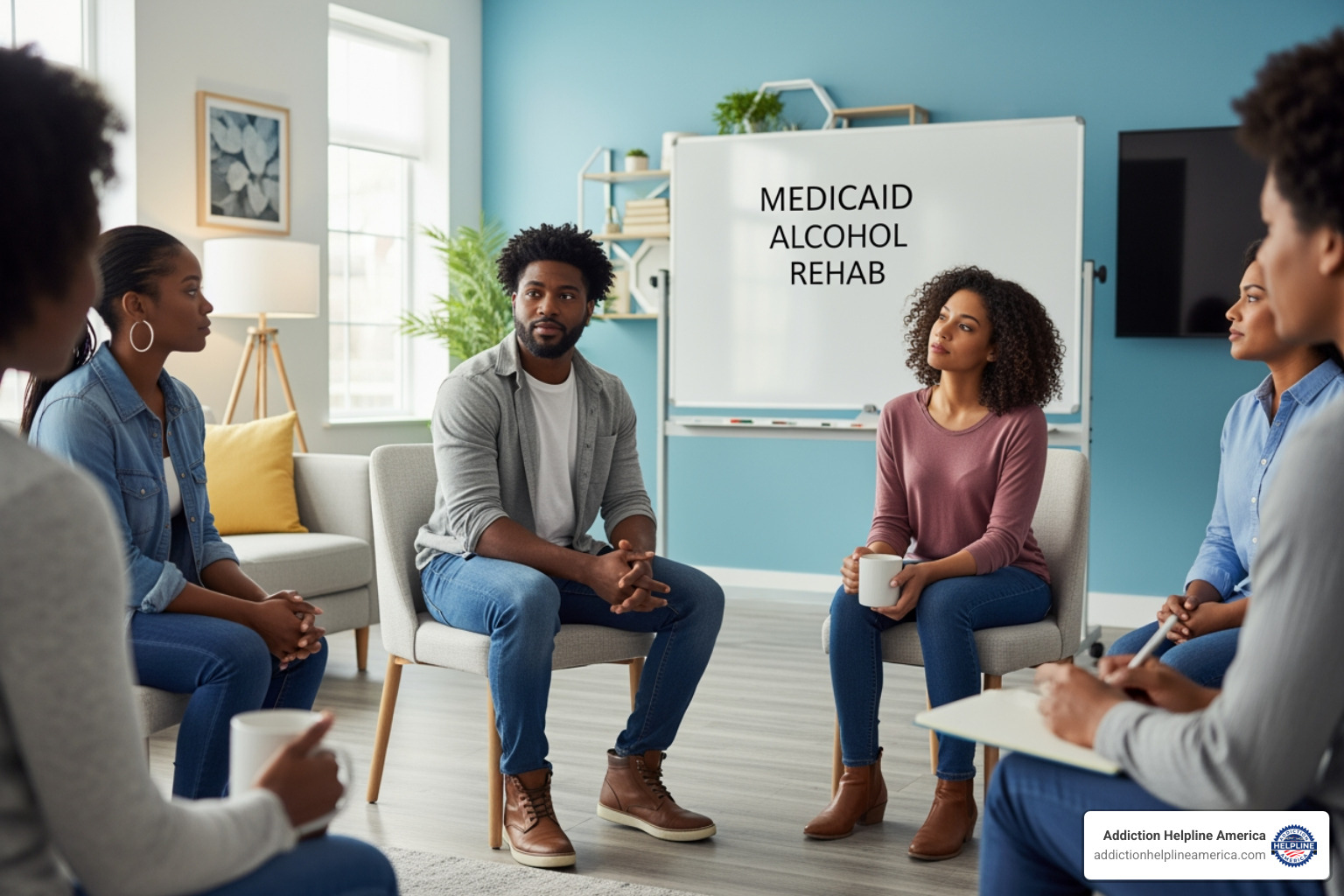
- The Joint Commission: A top healthcare accreditation body ensuring high standards for quality and safety.
- CARF International (Commission on Accreditation of Rehabilitation Facilities): Focuses on rehabilitation and behavioral health, emphasizing person-centered care.
- Council on Accreditation (COA): Another respected body that ensures organizations follow best practice standards.
Beyond national accreditation, every legitimate center must have a state license. In Missouri, this is from the Missouri Department of Mental Health (DMH). You can and should verify a facility’s license on your state’s health department website.
Key Questions for a Potential Medicaid Alcohol Rehab Facility
Once you’ve confirmed accreditation, ask pointed questions to dig deeper. A quality center will welcome your thoroughness.
- What evidence-based practices do you use? Look for scientifically proven methods like Cognitive-Behavioral Therapy (CBT) and Medication-Assisted Treatment (MAT).
- What are your staff’s credentials? Ensure therapists, counselors, and medical staff are licensed and certified in their fields.
- Do you offer a full continuum of care? A good facility provides a smooth transition from detox to inpatient, outpatient, and aftercare support.
- Do you provide integrated treatment for co-occurring disorders? If you struggle with addiction and a mental health condition like anxiety or depression, treating both simultaneously is critical. Learn more about this on our Dual Diagnosis Treatment page.
- Are treatment plans individualized? Your treatment plan should be customized to your unique history, needs, and goals. One-size-fits-all programs are rarely effective.
These questions will help you find a Medicaid alcohol rehab center that will genuinely support your recovery.
Step 5: Begin Treatment and Understand Potential Costs
You’ve found an accredited facility and are ready to begin treatment. This is where your path to recovery truly starts.
The process typically begins with a comprehensive intake and assessment. A treatment team will work with you to understand your history with alcohol, your physical and mental health, and your recovery goals. This is used to create a personalized treatment plan that outlines your therapies, level of care, and support services.
Your initial level of care depends on your needs. You might start with medical detox, move to inpatient residential treatment, or begin with an outpatient program (PHP or IOP). A quality treatment plan is flexible and will adjust as you progress through your recovery.
Understanding how long treatment may last can help you prepare. Every journey is different, but you can learn more about typical timelines in our guide on Rehab Duration.
Are There Co-payments or Out-of-Pocket Costs?
One of the biggest benefits of Medicaid alcohol rehab is its affordability. For most recipients, addiction treatment comes with minimal to no co-payments, ensuring that cost is not a barrier to life-saving care.
However, it’s wise to understand the financial details before you start. While most plans cover treatment with little to no cost, some states may require small, nominal co-pays for certain services. These are kept low to remain affordable. Some plans also have out-of-pocket maximums, capping what you might pay in a year.
Be aware that certain non-medical services, like sober living homes or luxury amenities, are typically not covered by Medicaid. Before beginning treatment, have a clear conversation with the facility’s admissions or financial counseling department. They can clarify what your specific Medicaid plan covers and what, if any, costs to expect.
At Addiction Helpline America, we can help you verify your benefits with treatment centers. Our goal is to remove every barrier, including financial confusion, that stands between you and the care you need.
Frequently Asked Questions about Medicaid for Rehab
What’s the difference between Medicaid and Medicare?
Understanding the difference between Medicaid and Medicare can help you steer your healthcare options. Both are government-funded, but they serve different populations.
Medicaid is a joint federal and state program for individuals and families with limited income. Eligibility is based on income, and it’s generally free or very low-cost for beneficiaries, making it a vital resource for Medicaid alcohol rehab.
Medicare is a federal program primarily for people aged 65 or older, as well as younger people with certain disabilities, regardless of income. It is funded by payroll taxes and typically involves costs like premiums, deductibles, and co-insurance.
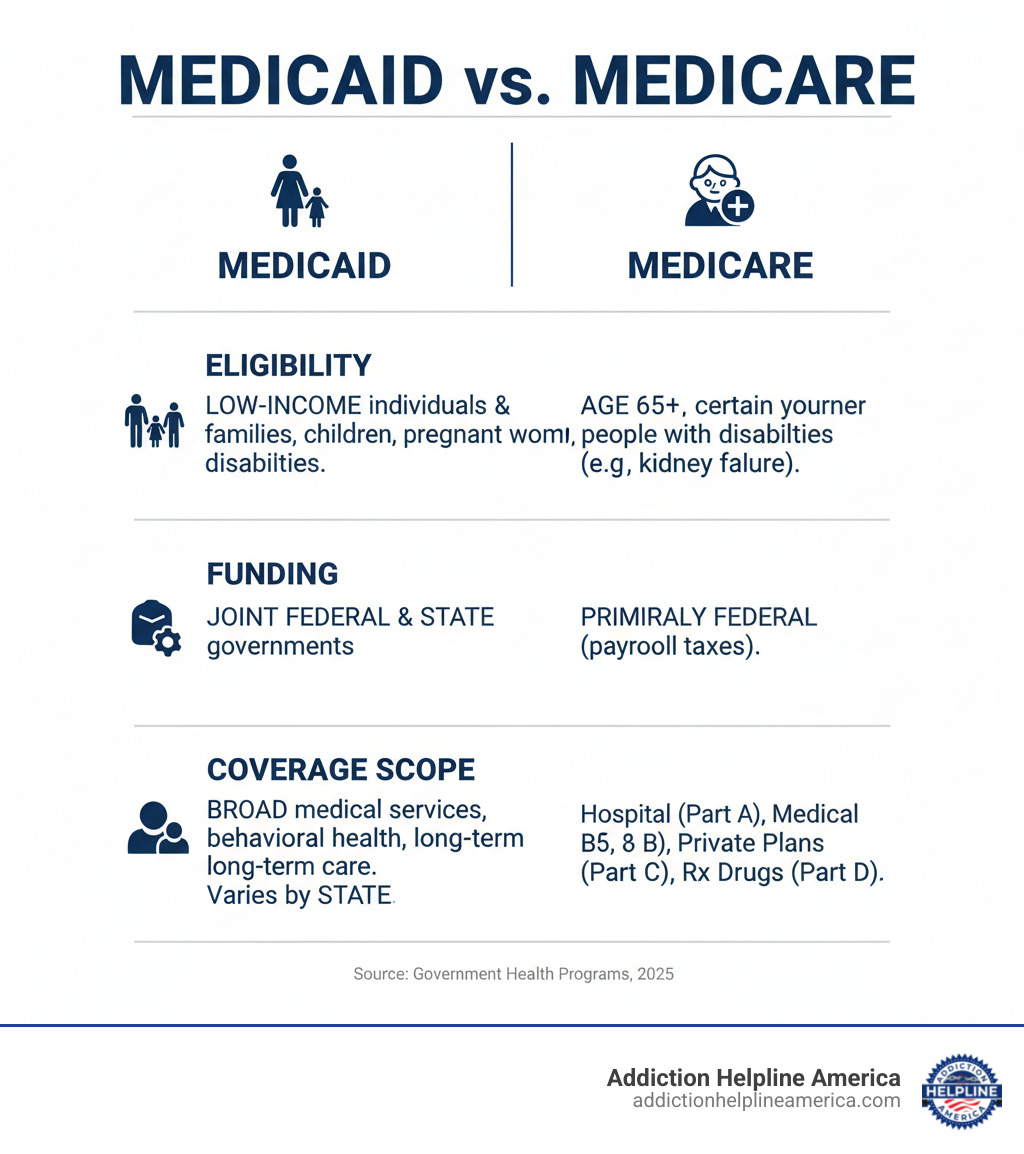
Here’s a quick comparison:
| Feature | Medicaid | Medicare |
|---|---|---|
| Eligibility | Based on income and family size; for low-income individuals, pregnant women, children, and people with disabilities | Based on age (65+) or certain disabilities (ESRD, ALS) |
| Funding | Jointly funded by federal and state governments | Primarily funded by federal government through payroll taxes |
| Coverage Scope | Broad medical services, extensive behavioral health, long-term care; varies by state | Hospital stays, medical insurance, private plans, prescription drugs |
| Cost | Generally free or very low-cost; minimal to no co-pays for addiction treatment | Involves premiums, deductibles, and co-insurance |
Can I be eligible for both Medicaid and Medicare?
Yes, many people qualify for both programs and are known as dual-eligible beneficiaries. This usually occurs when someone is over 65 or has a qualifying disability and also has a low income.
If you are dual-eligible, the programs work together. Medicare acts as the primary payer for services like hospital stays and doctor visits. Medicaid then acts as the secondary payer, covering costs that Medicare doesn’t, such as deductibles, co-payments, and services like long-term care.
For someone seeking Medicaid alcohol rehab, being dual-eligible is highly beneficial, as it can significantly reduce or eliminate out-of-pocket costs for treatment. Veterans may also be eligible for VA benefits alongside Medicaid and Medicare. Learn more on our page about Rehab Centers for Veterans.
How long will Medicaid cover my stay in rehab?
This is a common question about Medicaid alcohol rehab. The answer is that coverage duration depends on medical necessity, not arbitrary time limits.
As long as a healthcare professional determines that you require continued care and are progressing in your recovery, your Medicaid coverage can continue. Your treatment team will regularly assess your progress to justify the need for ongoing treatment.
While federal guidelines ensure robust coverage, some state-specific variations may exist regarding the number of covered days or sessions per year. However, these limits are often flexible, and extensions can be granted when clinically justified.
The level of care also affects duration. Detox may last a week, while inpatient treatment can range from 30 to 90 days or more. Outpatient programs can continue for several months. Medicaid’s focus is on continuing care and sustained recovery. Your treatment facility will work with your Medicaid plan to ensure you receive the appropriate length of stay at each level of care.
Your Path to Recovery Starts Here
If you’ve read this far, you’ve taken the courageous first step of seeking help. The journey to recovery from alcohol addiction is within reach.
By following the five steps we’ve outlined, you can access quality, life-saving Medicaid alcohol rehab without the burden of overwhelming costs. You now know that comprehensive care is covered, how to apply for it, and how to find an accredited facility. Financial barriers do not have to stand between you and recovery.
Recovery is possible, and it starts with a single decision to reach out for help.
At Addiction Helpline America, we provide free, confidential guidance to help you steer your benefits and connect with the right treatment program in our national network. We’ll help you understand your coverage and find a facility that meets your needs, whether it’s close to home or in another state.
We handle the details so you can focus on what matters: healing.
Your healthier, alcohol-free life is waiting. Don’t let another day pass. Find the right drug rehab program for you and take that crucial first step toward lasting recovery today.
Our helpline is 100%
free & confidential
If you or someone you care about is struggling with drug or alcohol addiction, we can help you explore your recovery options. Don’t face this challenge alone—seek support from us.
Programs
Resources
Will my insurance
cover addiction
treatment?
We're ready to help
Find the best
drug or alcohol treatment
center
Are you or a loved one struggling with addiction? Call today to speak to a treatment expert.

